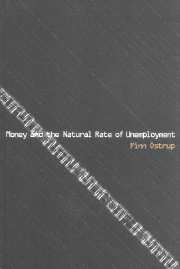Book contents
- Frontmatter
- Contents
- Preface
- Part I Introduction and main assumptions
- Part II The impact of monetary policy and inflation
- 4 Imperfect integration of securities markets
- 5 Monopolistic competition in bank markets
- 6 Utility from securities holdings
- 7 Hysteresis effects from monetary policy
- 8 The impact of inflation on bank earnings
- Part III The impact of monetary regimes
- Part IV Policy implications
- Appendix: Microeconomic foundations
- Bibliography
- Index
8 - The impact of inflation on bank earnings
Published online by Cambridge University Press: 22 September 2009
- Frontmatter
- Contents
- Preface
- Part I Introduction and main assumptions
- Part II The impact of monetary policy and inflation
- 4 Imperfect integration of securities markets
- 5 Monopolistic competition in bank markets
- 6 Utility from securities holdings
- 7 Hysteresis effects from monetary policy
- 8 The impact of inflation on bank earnings
- Part III The impact of monetary regimes
- Part IV Policy implications
- Appendix: Microeconomic foundations
- Bibliography
- Index
Summary
Introduction
The analysis is based on banks which operate under imperfect competition in the market for bank deposits. Due to imperfect competition banks are able to derive above normal earnings. Real bank earnings have implications for the real economy in two areas: (i) as the bank earnings from deposits arise from imperfect competition, it constitutes a potential source of revenue for the government, and (ii) assuming asymmetric information between the suppliers of external finance to the bank, the level of real bank earnings affects the conditions under which banks can raise finance from non-deposit external sources and through this there is an impact on the real bank lending rate. We will argue that the level of real bank earnings is affected by inflation, constituting a channel through which money can influence the real economy. Due to the impact of inflation on real bank earnings, we will further argue that the banks' willingness to undertake lending is determined by fluctuations in the inflation rate which are effected by the monetary regime. An investigation of real bank earnings in Denmark shows real bank earnings to be influenced by inflation, a lower inflation causing a fall in real bank earnings.
Section 8.2 outlines the theoretical framework. Section 8.3 discusses the implications of real bank earnings for the real economy. Section 8.4 reports the findings from an investigation of real bank earnings in Denmark over the 1976–1996 period. Section 8.5 brings a summary and conclusion.
- Type
- Chapter
- Information
- Money and the Natural Rate of Unemployment , pp. 160 - 168Publisher: Cambridge University PressPrint publication year: 2000



